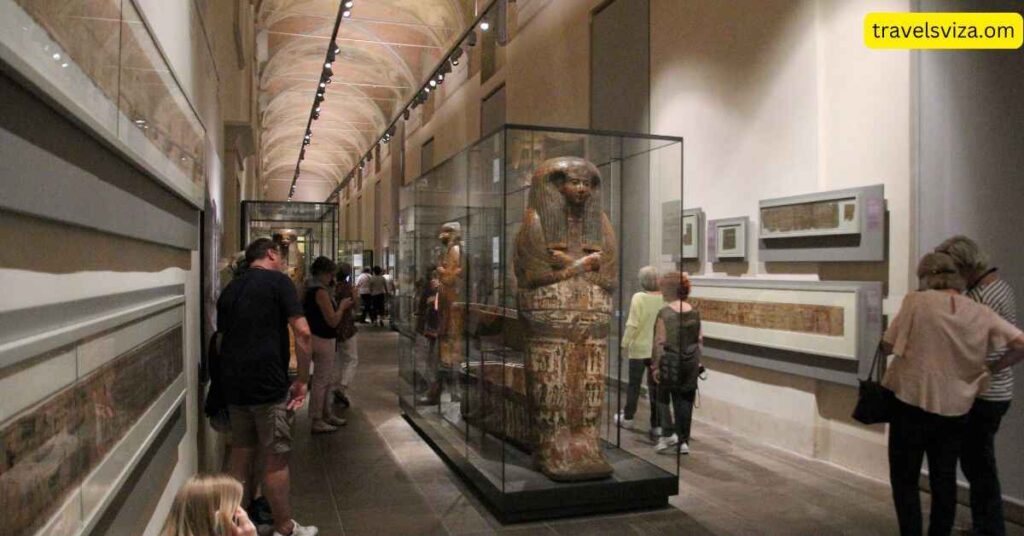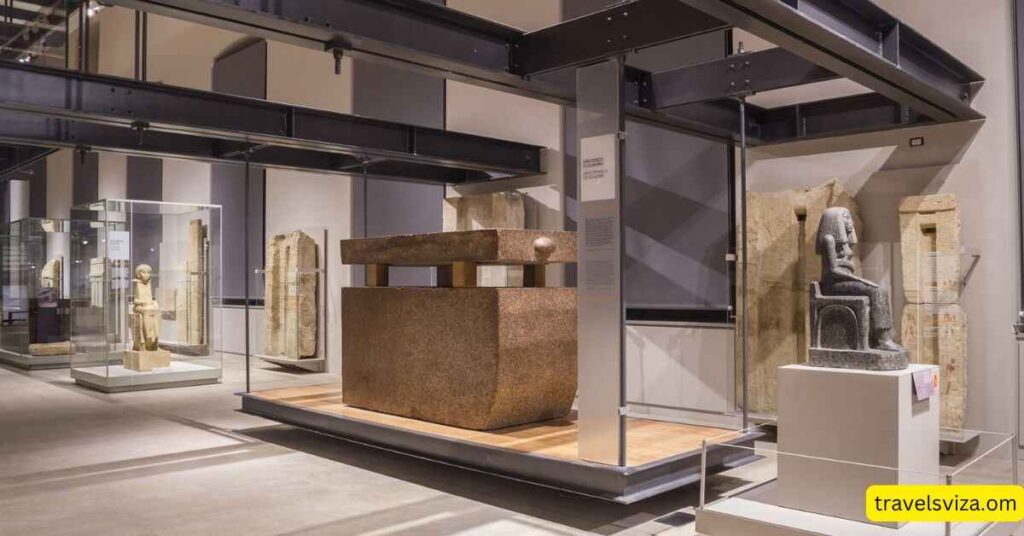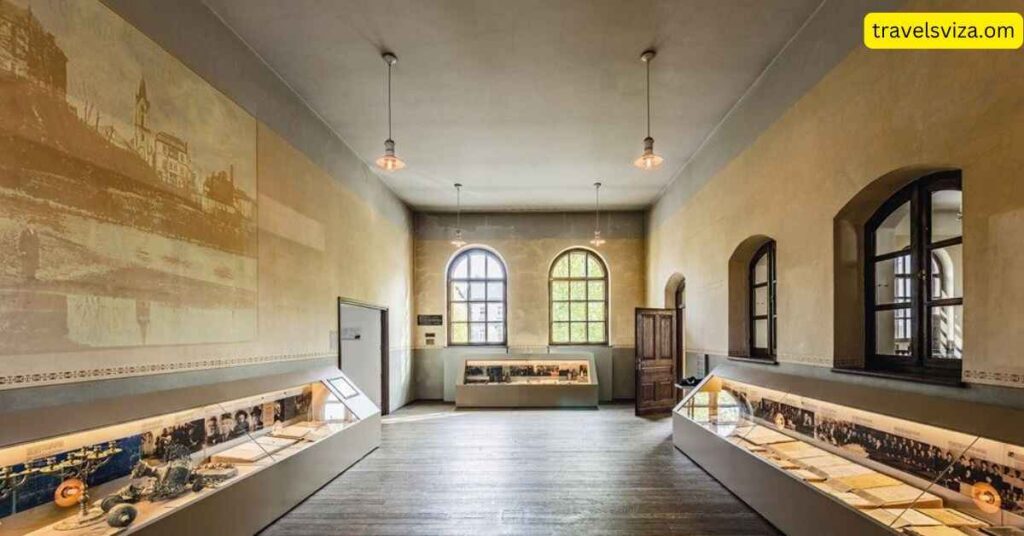The Museo Ebraico di Torino stands as one of Italy’s essential sites for understanding Jewish heritage. Despite Turin’s vibrant history, the stories, struggles, and contributions of the Jewish community often go unnoticed. Visitors may miss the chance to connect with this rich cultural heritage due to a lack of accessible resources.
Museo Ebraico di Torino fills this gap, offering a well-curated experience that brings to light centuries of Jewish history in Turin and Piedmont. This museum provides both locals and travelers a rare opportunity to learn, explore, and appreciate Jewish traditions, religious artifacts, and cultural artifacts in a meaningful way.
The Importance of Jewish Heritage Preservation
Museo Ebraico di Torino holds a unique role in preserving the Jewish heritage of Turin and beyond. As a site of cultural importance, it safeguards historical artifacts, stories, and practices of the Jewish people in Piedmont, ensuring they are not forgotten. Preservation goes beyond simply keeping objects safe; it is about protecting a legacy that fosters cultural understanding.
By showcasing the Jewish community’s enduring contributions and resilience, the museum opens the door to greater understanding and respect for Italian Jewish heritage. This focus on preservation strengthens connections between generations, bridging the past with the present in Turin’s historical heart.
The Origins of the Museo Ebraico di Torino
Museo Ebraico di Torino was founded to protect and honor the Jewish legacy of Turin. Established as a vital cultural institution, the museum aimed to bring the stories of Jewish life in Italy to a broader audience. The founders saw a need to document and share the experiences, struggles, and achievements of the Jewish community, particularly in Turin.
The city has a rich Jewish history dating back centuries, and this museum was created to reflect that. Opened in recent decades, the museum has become a testament to the resilience of Jewish culture and its importance in Italian history. Through this museum, the heritage of Turin’s Jewish community finds a permanent, respectful home.
Early Jewish Settlement in Turin
Jewish roots in Turin run deep, with records tracing back to the Roman Empire. Over time, the Jewish community has seen periods of growth, struggle, and transformation. By the Middle Ages, a Jewish population had become firmly established, contributing to the city’s culture and economy.
The centuries that followed were marked by cycles of acceptance and persecution, mirroring the broader European Jewish experience. Despite challenges, the Jewish people in Turin continued to preserve their customs, religion, and identity.
The museum carefully documents these periods, giving visitors an insight into a community that has thrived against the odds and remains an integral part of Turin’s history.
The Nahman of Breslaw Bridge Metaphor
The museum’s design draws from the teachings of Nahman of Breslaw, a revered Jewish thinker who used the metaphor of a bridge to describe life. The bridge represents the connection between different worlds, realities, and times. For the Jewish people, this bridge symbolizes both hope and challenge, reflecting a journey marked by resilience and adaptation.
It connects the past with the future, linking the community’s ancestral homeland with their lives in the diaspora. Museo Ebraico di Torino uses this bridge concept in its layout, creating a space that invites reflection and represents the ongoing journey of the Jewish people in Italy and across the world.
Exhibits and Collections

The museum houses a remarkable array of exhibits that reflect the depth and diversity of Jewish life in Turin. Visitors can explore both permanent and temporary exhibitions, each offering a new perspective on Jewish heritage. These collections capture aspects of daily life, spirituality, and history, providing a well-rounded look into the Jewish experience.
In addition, rotating exhibitions bring fresh themes and artifacts to the museum, ensuring there is always something new to discover. This dynamic approach keeps the museum engaging, allowing visitors to connect with the past while exploring how Jewish culture continues to evolve.
Religious Artifacts and Spiritual Heritage
Religious artifacts form a central part of the museum’s collection, highlighting the spiritual depth of Jewish traditions. Among the most significant items are Torah scrolls, menorahs, and prayer books that have been preserved for generations. Each artifact carries its own story and significance, offering insights into the practices that have shaped Jewish faith.
For instance, ancient Torah scrolls reveal the dedication of Jewish scribes, while intricately designed menorahs reflect the artistry and craftsmanship in Jewish religious expression. These items are more than historical objects; they are symbols of an enduring spiritual heritage that has been central to Jewish life for centuries.
Cultural and Historical Artifacts
The museum also features a wide range of cultural and historical artifacts that paint a vivid picture of Jewish life in Turin. Everyday items like traditional clothing, household tools, and personal belongings offer a glimpse into the daily lives of Jewish families. These artifacts illustrate not only the religious but also the social and cultural practices that define the community.
Through these objects, visitors can see how Jewish people in Turin balanced tradition with the changing influences of Italian culture. This part of the museum provides a unique view of Jewish culture as a living, evolving heritage embedded in the history of Turin.
Multimedia and Interactive Exhibits
The Museo Ebraico di Torino brings history to life through multimedia and interactive exhibits. Visitors can experience Jewish culture in dynamic ways, from virtual tours to interactive displays. Each exhibit invites visitors to engage actively with history, making it feel real and present.
The museum includes digital screens with historical footage and audio recordings that allow visitors to hear stories in the voices of Jewish people from the past. Through these immersive technologies, visitors are drawn into the Jewish experience, exploring rich traditions and lives through touchscreens, audio guides, and virtual reality experiences.
| Exhibit Type | Date Introduced | Key Features |
| Virtual Tours | 2018 | Digital journey through Jewish history |
| Interactive Displays | 2019 | Touchscreens, educational games |
| Audio-Visual Presentations | 2020 | Storytelling through sound and video |
| Virtual Reality Experiences | 2021 | Realistic portrayals of historical events |
Architecture and Design of the Museo Ebraico di Torino

The museum’s architecture beautifully blends modern and traditional elements. The building’s design preserves the historic structures while adding sleek, modern touches that highlight Jewish heritage. The exterior is simple yet striking, with metal and glass additions that enhance the building’s timeless look.
Inside, spacious halls lead visitors through exhibitions in a carefully designed layout that emphasizes continuity. Parts of the museum evoke the essence of old synagogues in Turin, connecting the past with the present in a subtle but powerful way. The thoughtful design invites visitors to feel both the weight of history and the spirit of renewal.
Use of Space and Accessibility
The museum ensures that every visitor, regardless of mobility, can access and enjoy the exhibits. The layout includes wide paths, ramps, and elevators for easy movement between floors. Special displays are set at various heights, allowing everyone to view them comfortably.
The Museo Ebraico di Torino is committed to inclusivity, making sure people of all ages and needs feel welcome. From guided audio tours to wheelchair-accessible spaces, every detail is designed with care, so that no one feels excluded. The thoughtful use of space makes the museum an inviting place for all visitors.
Educational Programs and Activities
The museum offers a range of educational programs that bring Jewish history and culture to life for visitors. These programs include workshops, seminars, and educational tours that cater to students, teachers, and families. Designed to deepen understanding, the activities allow participants to explore Jewish traditions and learn about Jewish life in Italy.
By collaborating with schools and cultural institutions, the museum ensures that these programs reach a wide audience. The educational mission of the Museo Ebraico di Torino goes beyond exhibitions, making learning an interactive and engaging experience.
School Programs and Youth Engagement
School programs at the museum are designed to inspire young minds. Students get to experience guided tours that align with their school subjects, making learning both fun and relevant. Teachers can bring their classes for hands-on workshops where students learn about Jewish customs, history, and artifacts.
These programs spark curiosity, helping students appreciate the contributions of Jewish culture to Italian heritage. By focusing on youth engagement, the museum creates a foundation for respect and understanding that lasts beyond the classroom.
Public Lectures and Workshops
The museum hosts public lectures and workshops that welcome people from all backgrounds. These events cover various topics, from Jewish history to art and literature, creating a space for open discussion and cultural exchange. Renowned speakers and scholars often share insights, helping attendees gain a deeper understanding of Jewish traditions.
Workshops invite participants to explore Jewish art, language, and cooking, making the learning experience hands-on. Through these public events, the Museo Ebraico di Torino fosters a sense of community, bridging gaps and encouraging dialogue between cultures and generations.
The Role of the Museo Ebraico di Torino in the Community
The Museo Ebraico di Torino holds a unique place in Turin, connecting people to Jewish history and culture. It serves as a bridge between the Jewish community and the general public, inviting all to learn about Jewish heritage. The museum hosts many events to bring together different groups, fostering understanding and appreciation.
Through these efforts, it has become more than just a museum. It has become a place of gathering, celebration, and dialogue. The Museo Ebraico di Torino actively builds bonds across communities, making Jewish culture accessible and known to all.
Community Engagement and Outreach Programs
The museum is deeply engaged in the community, providing outreach programs that reach people from all walks of life. These initiatives include workshops, cultural events, and open dialogues that bring people together. The museum holds interfaith dialogue sessions, where people of different religions and beliefs come together to discuss and learn.
These programs allow the museum to share Jewish traditions and encourage mutual respect and understanding. By opening its doors to everyone, the Museo Ebraico di Torino enriches the local community and promotes cultural harmony.
Partnering with Cultural Institutions in Turin
The Museo Ebraico di Torino collaborates with various cultural institutions throughout Turin. This collaboration strengthens Jewish heritage preservation and highlights the cultural contributions of the Jewish community. Working with other museums, educational centers, and art institutions, the museum brings Jewish history into Turin’s wider cultural scene.
These partnerships allow for joint events, shared exhibitions, and educational programs that celebrate Italian Jewish heritage. Together, these institutions create a network of support for preserving and honoring Jewish culture within Turin’s vibrant community.
| Partner Institution | Year of Collaboration | Joint Initiatives |
| Turin Museum of Modern Art | 2018 | Art exhibitions with Jewish themes |
| University of Turin | 2019 | Educational seminars on Jewish history |
| National Cinema Museum | 2020 | Jewish film screenings and discussions |
| Turin History Museum | 2021 | Joint exhibits on the Italian Jewish experience |
Preservation of Jewish Heritage

The Museo Ebraico di Torino is dedicated to preserving Jewish heritage for future generations. It safeguards rare artifacts, documents, and cultural items that tell the story of Jewish life in Italy. Through meticulous preservation, the museum ensures that Jewish history remains accessible.
These efforts also honor the struggles and achievements of the Jewish community over the centuries. By preserving these items, the museum keeps Jewish culture and history alive, offering a glimpse into the past for those who visit.
Conservation of Artifacts and Documents
The conservation of artifacts and documents is a crucial part of the museum’s mission. The museum carefully maintains fragile items, including ancient manuscripts, ceremonial items, and historical documents. These items are stored in controlled environments to protect them from decay. Expert conservationists work on each artifact, ensuring it retains its original form.
This dedication preserves the historical integrity of each item, allowing future generations to witness authentic pieces of Jewish heritage. The conservation efforts add depth to the museum’s exhibitions, showing visitors the physical history of Jewish life.
Digital Archiving and Virtual Exhibits
The museum has embraced digital archiving and virtual exhibits to extend its reach beyond physical walls. Through digital tools, the Museo Ebraico di Torino has created online collections and virtual tours that allow global audiences to explore its treasures. These virtual exhibits include high-quality images of artifacts, detailed descriptions, and interactive elements.
The museum also uses digital archiving to protect rare items, making digital copies that prevent loss of information over time. This approach allows the museum to share Jewish culture with a worldwide audience, ensuring these stories are accessible to all.
| Digital Initiative | Year Launched | Features |
| Online Virtual Tour | 2020 | Interactive tour with clickable exhibits |
| Digital Archive | 2021 | Digitized manuscripts and historical documents |
| Virtual Exhibition Series | 2022 | Temporary online exhibits on specific themes |
| Interactive Artifact Viewer | 2023 | 3D models of artifacts for closer examination |
Special Exhibits and Temporary Collections
Special exhibits bring new and unique perspectives to the museum, offering insights into Jewish history and culture. These temporary collections feature rare artifacts, artworks, and documents from around the world. Each exhibit is carefully curated, focusing on different aspects of Jewish life, from ancient rituals to modern art.
Past exhibits have included displays of Jewish wedding traditions, ancient religious texts, and art by contemporary Jewish artists. These special exhibits are a highlight of the museum’s offerings, drawing visitors interested in exploring diverse facets of Jewish heritage. Through these temporary collections, the museum keeps its displays fresh and engaging for repeat visitors.
Read This Blog: Canada’s Immigration Levels Plan 2025-2027
Museo Ebraico di Torino as a Cultural and Educational Hub
The Museo Ebraico di Torino stands as a beacon of education and culture in Turin. It plays a crucial role in teaching people about Jewish history and culture. The museum offers various Jewish education programs for schools, families, and individuals.
These programs focus on the rich contributions of Jewish communities to society. They cover topics from historical events to cultural practices. Visitors leave with a deeper understanding of the Jewish experience in Italy and the world. The museum not only preserves history but also helps foster a community that appreciates Jewish heritage.
Enhancing Understanding of Jewish Identity and Heritage
The museum enhances the public’s understanding of Jewish identity and heritage. It offers insights into Jewish traditions and their evolution through time. Exhibits highlight the diverse experiences of Jewish people across different cultures and periods. This includes displays on rituals, holidays, and daily life. Visitors learn how Jewish identity has adapted while preserving its core values.
The museum’s resources encourage exploration of Jewish cultural diversity. This education helps combat stereotypes and promotes respect among different communities. By focusing on these themes, the museum enriches visitors’ appreciation for the complexity of Jewish life.
Also Read: Understanding UK Spouse Visa Refusal: Your Essential Guide
Visitor Information and Museum Accessibility
The Museo Ebraico di Torino welcomes all visitors and strives to be accessible. It provides various options to ensure everyone can explore its offerings. The museum is equipped with ramps, elevators, and seating areas. These features make it easier for people with mobility challenges to enjoy the exhibits.
The museum’s staff is trained to assist visitors with specific needs. Open hours allow for convenient visits, and guided tours are available to enhance the experience. The museum encourages everyone to engage with Jewish heritage and history. This commitment to accessibility reflects the museum’s goal of inclusivity and community outreach.
| Visitor Information | Details |
| Opening Hours | Monday to Friday: 10 AM – 6 PM |
| Accessibility Features | Ramps, elevators, and accessible restrooms |
| Guided Tours | Available upon request |
| Admission Fee | Adults: €5, Students and Seniors: €3 |
| Special Events | Monthly cultural programs and lectures |
FAQ
What is the Museo Ebraico di Torino?
The Museo Ebraico di Torino is a museum dedicated to preserving and showcasing the history, culture, and heritage of the Jewish community in Turin, Italy. It features a variety of exhibits, artifacts, and educational programs that highlight Jewish life and contributions throughout history.
What are the main exhibits at the museum?
The museum hosts a range of exhibits, including religious artifacts like Torah scrolls and ceremonial items, cultural and historical artifacts that reflect daily life in the Jewish community, as well as multimedia displays that engage visitors and enhance their understanding of Jewish culture.
Does the museum offer educational programs?
Yes, the Museo Ebraico di Torino offers educational programs for schools and the general public. These include guided tours, workshops, and lectures aimed at promoting awareness and understanding of Jewish history and culture.
What are the visiting hours for the museum?
The museum is typically open from Tuesday to Sunday, with varying hours. It is advisable to check the official museum website for the most current visiting hours and any special events.
Is the museum accessible to people with disabilities?
Yes, the Museo Ebraico di Torino is committed to accessibility. It offers features such as ramps and elevators to ensure that all visitors, including those with disabilities, can enjoy the exhibits and facilities.
Conclusion
The Museo Ebraico di Torino is more than just a museum. It is a vibrant place where Jewish history comes to life. Visitors can explore rich exhibits that tell the story of the Jewish community in Turin. From ancient artifacts to modern educational programs, the museum offers something for everyone.
It plays a vital role in preserving Jewish heritage and fostering understanding. A visit here is an opportunity to connect with the past and appreciate the contributions of Jewish culture today.